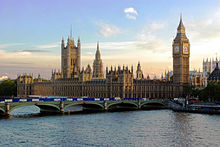This article needs additional citations for verification. (December 2023) |
The Parliament of the United Kingdom of Great Britain and Northern Ireland[g] is the supreme legislative body of the United Kingdom, and may also legislate for the Crown Dependencies and the British Overseas Territories.[4][5] It meets at the Palace of Westminster in London. Parliament possesses legislative supremacy and thereby holds ultimate power over all other political bodies in the United Kingdom and the Overseas Territories. While Parliament is bicameral, it has three parts: the sovereign, the House of Lords, and the House of Commons.[6] The three parts acting together to legislate may be described as the King-in-Parliament.[7] The Crown normally acts on the advice of the prime minister, and the powers of the House of Lords are limited to only delaying legislation.[8]
The House of Commons is the elected lower chamber of Parliament, with elections to 650 single-member constituencies held at least every five years under the first-past-the-post system.[9] By constitutional convention, all government ministers, including the prime minister, are members of the House of Commons (MPs), or less commonly the House of Lords, and are thereby accountable to the respective branches of the legislature. Most Cabinet ministers are from the Commons, while junior ministers can be from either house.
The House of Lords is the upper chamber of Parliament,[10] comprising two types of members. The most numerous are the Lords Temporal, consisting mainly of life peers appointed by the sovereign on the advice of the prime minister,[11] plus up to 92 hereditary peers. The less numerous Lords Spiritual consist of up to 26 bishops of the Church of England. Before the establishment of the Supreme Court of the United Kingdom in 2009, the House of Lords performed judicial functions through the law lords.
The Parliament of the United Kingdom is one of the oldest legislatures in the world, and is characterised by the stability of its governing institutions and its capacity to absorb change.[12] The Westminster system shaped the political systems of the nations once ruled by the British Empire, and thus has been called the "mother of parliaments".[13][h]
Cite error: There are <ref group=lower-alpha> tags or {{efn}} templates on this page, but the references will not show without a {{reflist|group=lower-alpha}} template or {{notelist}} template (see the help page).
- ^ "About: Members of Parliament". Co-operative Party. Retrieved 10 May 2024.
- ^ "Lords membership". MPs and Lords. UK Parliament.
- ^ "State of the parties". MPs and Lords. UK Parliament. Retrieved 16 July 2023.
- ^ Colonial Laws Validity Act 1865
- ^ Statute of Westminster 1931
- ^ "What is the role of Parliament?". How Parliament works. UK Parliament. Retrieved 10 February 2008.
- ^ "Queen in Parliament". The Monarchy Today: Queen and State. The British Monarchy. Archived from the original on 18 January 2008. Retrieved 19 February 2008.
The phrase 'Crown in Parliament' is used to describe the British legislature, which consists of the Sovereign, the House of Lords and the House of Commons.
- ^ "Primacy of the Commons, role of the Lords, and Lords reform". 3 November 2006. Retrieved 13 November 2018.
22. Our remit requires us to accept "the primacy of the House of Commons". It is worth considering what this means in the context of legislation, and of the conventions operating between the two Houses. 23. Constitutional and Administrative Law by O. Hood Phillips and Jackson declares it to be a constitutional convention that "In cases of conflict the Lords should ultimately yield to the Commons."[34] It goes on to observe that this convention was backed until 1911 by the possibility of packing the Lords with government supporters, and has been underpinned since then by the Parliament Acts.
- ^ "How Parliament works". About Parliament. UK Parliament. Retrieved 21 June 2017.
- ^ "Work of the House of Lords". parliament.uk. Retrieved 7 December 2022.
- ^ "Lords Spiritual and Temporal". Glossary. UK Parliament. Retrieved 10 February 2008.
- ^ Mc Manamon, Anthony (2012). The House of Lords and the British political tradition (Ph.D. thesis). University of Birmingham.
- ^ Jenkin, Clive. "Debate: 30 June 2004: Column 318". House of Commons debates. Hansard. Retrieved 10 February 2008.
- ^ "Messers. Bright And Scholefield at Birmingham". The Times. 19 January 1865. p. 9.



